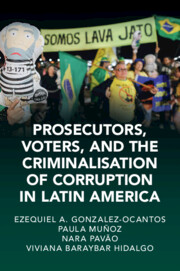Book contents
- Prosecutors, Voters, and the Criminalisation of Corruption in Latin America
- Cambridge Studies in Law and Society
- Prosecutors, Voters, and the Criminalisation of Corruption in Latin America
- Copyright page
- Contents
- Figures
- Tables
- Acknowledgements
- 1 Introduction
- Part I Causes
- Part II Public Reactions
- Part III Conclusions
- 9 Theoretical Lessons and a Normative Assessment
- Bibliography
- Index
- Cambridge Studies in Law and Society
9 - Theoretical Lessons and a Normative Assessment
from Part III - Conclusions
Published online by Cambridge University Press: 05 April 2023
- Prosecutors, Voters, and the Criminalisation of Corruption in Latin America
- Cambridge Studies in Law and Society
- Prosecutors, Voters, and the Criminalisation of Corruption in Latin America
- Copyright page
- Contents
- Figures
- Tables
- Acknowledgements
- 1 Introduction
- Part I Causes
- Part II Public Reactions
- Part III Conclusions
- 9 Theoretical Lessons and a Normative Assessment
- Bibliography
- Index
- Cambridge Studies in Law and Society
Summary
Crusades spur debates about what the boundaries of legal possibility ought to be when it comes to attacking corruption. They also pose the question of how much corruption we should tolerate in the name of the rule of law. While a zealous prosecutorial modus operandi is essential to dismantle criminal networks backed by state power, it can also stand in tension with due process. With this in mind, the chapter begins with a discussion of how the book’s account of the drivers of crusades contributes to debates about institution building, noting the perils of unchecked institutional (prosecutorial) strength. It also discusses the book’s contributions to the political behaviour literature, especially how attention to emotions and political cynicism offers new perspectives on the puzzle of limited electoral accountability for corruption. The chapter then explores the (de)merits of criminalisation, pointing to the importance of “norming” prosecutorial zeal in order to render prosecutions less controversial and their outcomes less precarious. It concludes with a discussion of what this “norming” exercise could look like.
Keywords
- Type
- Chapter
- Information
- Prosecutors, Voters and the Criminalization of Corruption in Latin AmericaThe Case of Lava Jato, pp. 261 - 281Publisher: Cambridge University PressPrint publication year: 2023



